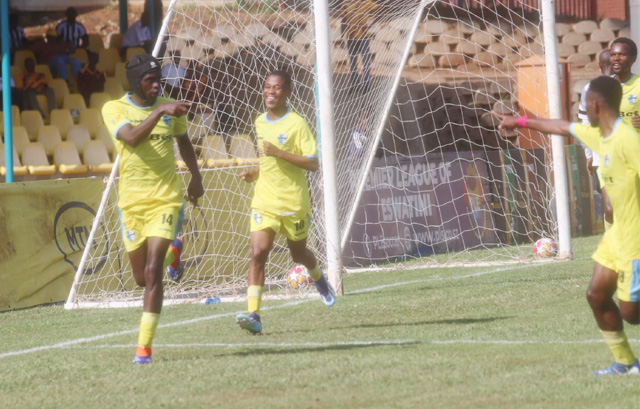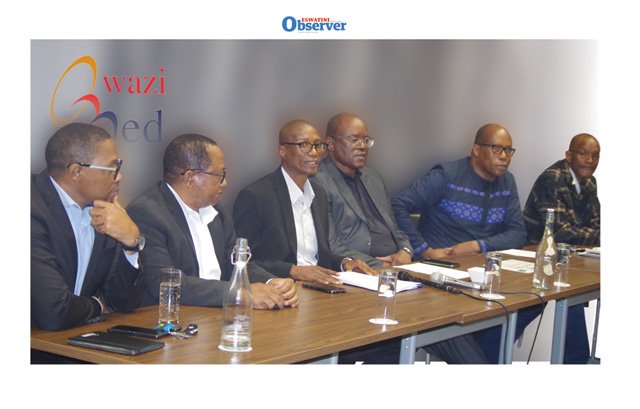By Mhlonishwa Hlophe | 2020-05-24

University of Eswatini (UNESWA) students are strongly opposing the institution’s call for registration in readiness for the online learning scheduled for June 1-5, 2020.
This come after the university, through the office of the registrar Dr Salebona Simelane issued a statement announcing that the Senate had passed resolutions which credited the adoption of the online learning. This means tests and assignments shall be administered online.
Simelane announced registration for the exercise would commence on June 1 to 5, 2020, and privately sponsored students who have not yet registered should pay at least E2 500 and proceed to register online to be able to access teaching material on Moodle.
Questioned further on this statement, Simelane said regarding students registration in preparation for online teaching; “We have just issued an official statement on online teaching and I believe the University Senate is empowered by law to do so.”
However, the Students Representative Council (SRC) promptly responded to the resolutions by Senate by appealing the decision.
In a letter dated May 22, the students stated that: “The UNESWA SRC on behalf of the student body would like to raise concerns in response to the standing resolution as per the senate meeting dated the 20th of May 2020 at 1000hrs at the Main Conference Room.
“The reality is a majority of students within the institution contradicts the bogus resolution that has been released by the university management.
“The resolution creates a facade that students have financial capabilities and adequate electronic devices to abruptly switch to the partially inclusive e-learning: truth is most students are under-resourced and not in conducive spaces and geographical location to sustain E-learning.”
The letter stated that inaccurate conclusions drawn by the management, which are based upon questionable sampling methods, the online method is a feasible alternative that will allow students to continue with their academic programmes, with minor glitches.
It asserted that as concerned studentry for the poor and dejected black youth at respective campuses, they have a great reason to believe otherwise.
“We understand the need and the logic behind rescuing the 2019/20 academic year. But there’s a very little nobility in this action when this presents a massive risk of leaving many students behind because of half-baked and haphazardly implemented processes.
Students
“The fact remains that students are incapacitated in terms of IT skills and knowledge therefore, the SRC stands to believe that proper orientation has to be given to students prior to implementation of the undercooked e-learning as much as lecturers are given sufficient training,” reads the letter.
Online learning has caused uproar among students in almost all the country’s tertiary institutions. The students argue that they do not have sufficient resources to perform the exercise.
In the past couple of months, the Swaziland National Union of Students (SNUS) demanded that all higher learning institutions should provide students with free smartphones before conducting online lessons.
They stated that the students should have access to internet connection regardless of their geographic location and there should be a clear route of communication between students and lecturers.
A majority of students have said they are disappointed at the manner the resolution was presented to them, as they feel they should have been made aware before making a ruling.
Students voiced their unhappiness on the online lessons through their WhatsApp group.
“Online learning will not accommodate a vast number of learners. The arrangement does not favour a majority of the students.
“Some stay close to the border gates of our neighbouring countries, where network is horrible. The university has failed to take that into consideration even when the SRC presented that case to them,” said one student.
The students argue that it is a fact that some do not know anything about online learning. They conceded that so it is stressing that now they will have to learn online even without any practice.
A student from Pigg’s Peak mentioned that some of the conditions the students signed before the scholarship boardwere being flouted.
“We agreed that we were to receive monthly allowances for a period of 10 months from August to May of the academic year. It is stressing to note that we have to learn online and we do not have money to purchase bundles for the lessons to go smoothly undisrupted.”
Students vented also revealed that about 70% of the 7 000 students’ population lack gadgets to push such mode of instruction.
They said lecturers have been conducting lessons online since the advent of the lockdown. They said their main concern was that only a few of the learners were able to partake while a majority was not accommodated.
“Complaining to the lecturers doesn’t help as they are also pushed to enforce the UNESWA agenda. The lecturers say once you miss an assignment, tests or quiz which are all done online, you get a zero. The university is again refusing learners to access learning material from the university bookshops in a premise that book allowances have been not paid by the government,” said one student.
Gathered
They mentioned that they have gathered that the university is planning to use the book allowances to buy gadgets for the students to be used for the online learning.
One post in the students’ group states that the book allowances, according to the terms and conditions signed between the ministry of labour under scholarship board and learners asserts that learners are to use their book allowances to buy anything from the university's bookshops to help in their learning, like pens, pencils, cellphones calculators.
The learners also registered their unhappiness at the university for refusing to allow them entry to the institution to fetch their learning materials and other goods they may need whilst at home. They stated that most of them left their materials with the hope that they would be back at the university soon.
They said they never anticipated that they would be away for a long period. They highlighted their fear that they may find their rooms broken into.
Self-sponsored students to be most affected
UNESWA students fear that the proposed online learning will affect mostly the self-sponsored students.
These are students who are not scholarship beneficiaries (be it government or private sponsorship).
Some students feel the self-sponsored students will be the most affected by the online learning, as they will be forced to get funds to purchase all the resources required in this exercise.
Smile Sukati is amongst the self-sponsored students and she feels the timing of the online lessons was wrong as everybody was having difficulty in accessing funds because of the ongoing lockdown. She said, for instance with those who operate businesses, they are currently not doing well financially. “Most of my colleagues will not have a peaceful transition into online learning, I think many will be excluded from the whole exercise,” she said.
She said there was a large gap in computer literacy among students. “The authorities should, therefore take it upon themselves to introduce what can be called ‘online orientation’ which will serve as a guide through the whole process of E-learning before the actual learning starts.”
Another student shared that a majority wastill behind in terms of ICT skills and knowledge, under-resourced in terms of access to data, network and electronic devices and greatly disadvantaged as they do not live in homes that could provide a conducive learning environment.
“Socio-economic issues such as access to electricity are factors that should also be considered by the university, because one will be unable to have the basic means to charge their electronic devices. This causes the greatest challenge as we try to adopt and adapt to the new normal due to the pandemic outbreak,” stated a student.
They mentioned that poorly designed E-learning models such as the one they are proposed to use (WhatsApp) will not bear positive outcomes.
They said they will not allow themselves to walk into a trap of participating in a system that will result in their failure and at the same time compromise their chances of being hired after graduation.
Therefore, the students are pleading with the authorities to be resourced with material to ensure smooth and effective E-learning. They said learning should not commence until all resources reach all students would be avoid a situation whereby some students are left out with a backlog of assignments and tests to catch up.
Students want UNESWA to address concerns on e-learning
The UNESWA SRC, through its Secretary General Bongani Sifundza, has registered concerns that they feel should be addressed by the university before the implementation of the online learning.
Amongst the concerns they want addressed is that; “Since they no longer reside on campus since the 17th of March 2020 with their residential fees paid fully the university should consider refunding them so that they can redirect their funds to cater for online learning.”
Tuition fee, according to 2.00 (financial regulations), 2.11 tuition fulltime per credit is E549 whilst tuition part time is E417 per credit.
“Since online learning will define all students as part time or distance students, the university should refund students the difference from the tuition fee so that they could improvise in the purchasing of the online learning aids such as data bundles and necessary electronics, to mention a few.”
Students
The students conceded that the university should also redirect book allowance to student’s personal accounts to buy necessary learning aids as they are switching to online learning.
They also want the university to give students the option or alternative to deregister the current semester without forfeiting their financial records of the semester.
“The University should refund the entire student body their respective caution fee of E280.
“The university management should come out clear on the assessment model to be adopted and utilised for both assessments (formative and summative).
“The university management is given the length period of three days until Tuesday 26th 2020, 09.00 am to respond to the above concerns. Failure to solve the fundamental concerns raised by the students, the Student Representative Council [SRC] is ready to take the legal route on the issues,” reads the letter.
share story
Post Your Comments Below

Sisonkhe FC ……........….. (0)2
Mpendulo 55th, Thab...
Health officials have reported a significant decrease in new HIV infections among men, in...
Social media users have reacted with shock and sorrow to the death of former Mhlume Unite...

THE recent turn of events at SwaziMed has underscored deep-rooted governance challenges that thre...
All material © Swazi Observer. Material may not be published or reproduced in any form without prior written permission.
Design by Real Image Internet